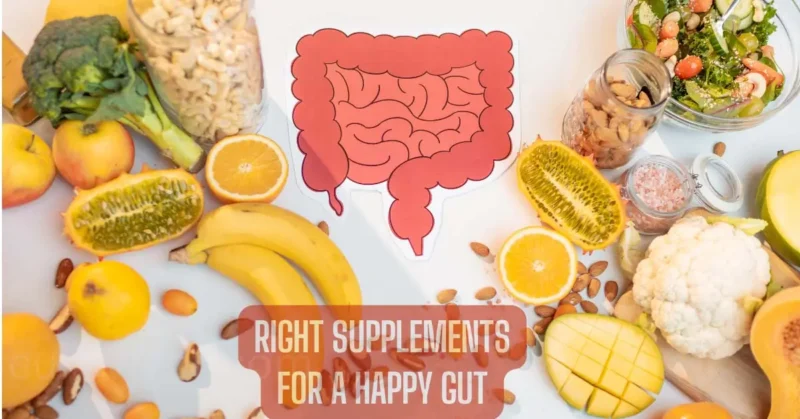Discover the best gut health supplements, how to make your gut happy, and the top superfoods for your digestive system. Learn how to choose the right supplements and explore the benefits of a 7-day gut reset for optimal well-being.
Thank you for reading this post, don't forget to subscribe!Understanding Gut Health

Are you feeling lost in the jungle of gut health supplements? Don’t fret! Have you ever felt like your stomach was holding a secret rebellion? Bloating, indigestion, and bathroom battles all point to one thing: your gut needs some TLC. But before you dive headfirst into a sea of supplements promising instant bliss to your belly, let’s take a deep breath and explore the gut-supplement world with a discerning eye.
Gut health is fundamental to our overall well-being. The gastrointestinal tract is responsible for digestion and plays a crucial role in the immune system, mental health, and more. To maintain good gut health, it is necessary to include the right nutrients in our diets. This guide will cover in-depth discussions of the top supplements for gut health and how they support a balanced gut microbiota.
The Importance of Gut Microbiome
The gut microbiome consists of trillions of microorganisms, including bacteria, viruses, fungi, and other microbes. These microorganisms are vital for various bodily functions, such as:
- Digestion and nutrient absorption: Beneficial bacteria help break down food and absorb nutrients.
- Immune system support: A healthy gut microbiome strengthens the immune system.
- Mental health: The gut-brain axis connects gut health with mental well-being, influencing mood and cognitive functions.
Top Gut Health Supplements
Probiotics
Probiotics are live beneficial bacteria that can improve gut health by enhancing the microbiome’s diversity and balance. They are found in fermented foods and supplements. The best probiotics for gut health include the following:
- Lactobacillus: Known for reducing irritable bowel syndrome (IBS) symptoms and improving lactose digestion.
- Bifidobacteria: help alleviate constipation and boost the immune system.
- Saccharomyces boulardii is a yeast that combats diarrhea and antibiotic-associated digestive issues.
Prebiotics
Prebiotics are non-digestible fibers that feed beneficial gut bacteria. By promoting the growth of these bacteria, prebiotics help maintain a healthy gut microbiome. Key prebiotics include:
- Inulin: It is found in chicory root, onions, and garlic, and it enhances calcium absorption and promotes digestive health.
- Fructooligosaccharides (FOS), present in bananas, asparagus, and leeks, support the growth of beneficial bacteria.
- Galactooligosaccharides (GOS): In dairy products and certain plants, GOS aids in reducing gut inflammation.
Digestive Enzymes
Digestive enzymes aid in breaking down food into nutrients the body can absorb. These enzymes are crucial for preventing digestive discomfort and promoting nutrient absorption. Critical digestive enzymes include:
- Amylase: Breaks down carbohydrates.
- Protease: Digests proteins into amino acids.
- Lipase: Facilitates the digestion of fats.
Fiber Supplements
Dietary fiber is essential for healthy digestion and regular bowel movements. Fiber supplements can benefit those who do not consume enough fiber. Types of fiber supplements include:
- Psyllium husk is a soluble fiber that helps with constipation and overall digestive health.
- Methylcellulose is a synthetic fiber that aids in bowel regularity.
- Glucomannan: Derived from the konjac plant, this fiber supports weight management and digestive health.
L-Glutamine
L-glutamine is an amino acid that supports intestinal health by maintaining the integrity of the gut lining. It mainly benefits individuals with leaky gut syndrome and other gastrointestinal disorders.
Zinc Carnosine
Zinc carnosine is a combination of zinc and the amino acid carnosine. It promotes gut health by supporting the mucosal lining and reducing inflammation. This supplement effectively treats gastric ulcers and enhances the digestive tract’s overall function.
How to Choose the Right Gut Health Supplement
Consider Your Specific Needs
Choosing the right gut health supplement starts with identifying your specific digestive health concerns and goals. Different supplements target various aspects of gut health, so it’s essential to understand what your body needs. Here are some common gut issues and the supplements that may help:
- Bloating and Gas: If you frequently experience bloating and gas, a probiotic supplement with strains like Lactobacillus and Bifidobacterium can help balance the gut bacteria and reduce these symptoms.
- Constipation: Fiber supplements such as psyllium husk or inulin can promote regular bowel movements by adding bulk to the stool and aiding in its passage through the intestines.
- Diarrhea: Probiotics, especially Saccharomyces boulardii, can help manage and prevent diarrhea by restoring the balance of good gut bacteria.
- Leaky Gut Syndrome: L-Glutamine is beneficial for healing the gut lining and reducing inflammation associated with leaky gut syndrome.
- Overall Digestive Health: A combination of digestive enzymes (amylase, protease, and lipase) can improve the breakdown and absorption of nutrients, enhancing overall digestive function.
Assess your symptoms and health objectives to determine which type of supplement will be most beneficial for you.
Check the Ingredients
When selecting a gut health supplement, examining the ingredient list is crucial to ensure the product is high quality and free from potentially harmful additives. Here to look for:
- Clinically Proven Ingredients: Select supplements with components supported by scientific studies. It guarantees the product and efficacy.
- Purity and Potency: Choose products free from artificial additives, fillers, and common allergens like gluten, dairy, and soy. High-quality supplements should have a clean ingredient profile.
- Probiotic Strains: If choosing a probiotic, look for supplements that specify the strain and CFU (colony-forming units) count. Higher CFU counts generally indicate a more potent product. Common effective strains include Lactobacillus acidophilus, Bifidobacterium bifidum, and Saccharomyces boulardii.
- Prebiotics and Enzymes: Check for ingredients like inulin, FOS, and GOS in prebiotics. For digestive enzymes, ensure the presence of critical enzymes like amylase, protease, and lipase.
Reading labels carefully can help you avoid products that may contain unnecessary or harmful substances.
Consult a Healthcare Professional
Before incorporating any new supplement into your routine, it is essential to consult with a healthcare professional, such as a doctor or a registered dietitian. Here’s why:
- Personalized Advice: A healthcare professional can provide recommendations based on your health needs, medical history, and current medications. They can identify any potential interactions or contraindications.
- Safety and Efficacy: They can help ensure the supplement is safe for you, particularly if you have underlying health conditions or are taking other medications.
- Dosage and Duration: They can advise on the appropriate dosage and duration of use to achieve the best results without adverse effects.
- Monitoring Progress: Regular consultations can help track your progress and make necessary adjustments to your supplement regimen.
Consulting with a healthcare provider ensures you make informed decisions and safely incorporate supplements into your health plan.
FAQs on Gut Health
Q. What is the best supplement for good gut health?
The best supplement for good gut health is a high-quality probiotic. Probiotics introduce beneficial bacteria into your gut, helping to balance the gut microbiome and improve digestive health. Strains such as Lactobacillus and Bifidobacterium are particularly effective. Additionally, supplements containing a combination of probiotics and prebiotics (known as synbiotics) can offer enhanced benefits by providing both the bacteria and the nutrients they need to thrive.
Q. How can I make my gut happy?
To make your gut happy, consider the following steps:
- Eat a Balanced Diet: Include plenty of fiber-rich foods, such as fruits, vegetables, whole grains, and legumes.
- Incorporate Fermented Foods: Foods like yogurt, kefir, sauerkraut, and kimchi are rich in probiotics that support gut health.
- Stay Hydrated: Drink plenty of water to aid digestion and maintain a healthy gut lining.
- Regular exercise helps stimulate the digestive system and maintain gut health.
- Reduce Stress: Practice stress-relief techniques such as meditation, yoga, or deep breathing exercises.
- Limit processed foods and sugars: These can disrupt the balance of gut bacteria and lead to digestive issues.
Q. What is the #1 substance to help heal the gut?
L-glutamine is often regarded as the #1 substance for healing the gut. It is an amino acid that supports the repair and maintenance of the gut lining. L-glutamine helps reduce inflammation, enhances intestinal barrier function, and mainly benefits individuals with leaky gut syndrome or inflammatory bowel conditions.
Q. How do I know what supplements I should be taking?
To determine which supplements you should be taking, follow these steps:
- Assess Your Symptoms: Identify any specific digestive issues you are experiencing, such as bloating, constipation, or diarrhea.
- Set Your Health Goals: Determine what you aim to achieve with supplements, such as improving digestion, boosting immune function, or healing the gut lining.
- Research Ingredients: Look for supplements with clinically proven, high-quality ingredients. Avoid those with artificial additives or allergens.
- Consult a healthcare professional: Speak with a doctor or registered dietitian who can provide personalized advice based on your health history and current medications.
- Monitor Your Response: Once you start taking a supplement, keep track of how your body responds and make adjustments as needed with the guidance of a healthcare professional.
Q. What is a 7-day gut reset?
A 7-day gut reset is a short-term plan designed to improve gut health by eliminating irritants and promoting beneficial practices. Here’s what it involves:
- Eliminate Processed Foods: Cut out processed foods, sugars, and alcohol.
- Focus on Whole Foods: Eat a diet rich in fruits, vegetables, lean proteins, and whole grains.
- Include Fermented Foods: Consume fermented foods like yogurt, kefir, kimchi, and sauerkraut.
- Stay Hydrated: Drink plenty of water and herbal teas.
- Reduce Stress: Engage in stress-reducing activities like meditation or gentle exercise.
- Support with Supplements: Use probiotics and prebiotics to support your gut microbiome.
- Get Adequate Sleep: Ensure you get enough restorative sleep each night.
Q. What are the three superfoods for your gut?
Three superfoods that are excellent for gut health are:
- Kefir: A fermented milk drink rich in probiotics, kefir helps diversify the gut microbiome and improve digestion.
- Kimchi: A traditional Korean fermented vegetable dish packed with probiotics, fiber, and vitamins, kimchi promotes a healthy gut environment.
- Bananas: High in fiber and prebiotics, bananas help feed beneficial gut bacteria and support regular bowel movements.
Conclusion
Maintaining optimal gut health is pivotal for overall wellness. Incorporating the right gut health supplements can significantly enhance digestive function, boost the immune system, and improve mental health. By understanding the various types of supplements available and choosing those that align with your specific needs, you can achieve a healthier and more balanced gut microbiome.
Read more articles on Health and Wellness.
You might like to read:
How to Relieve Critical Low Back Pain at Home: 10 Proven Natural Remedies

